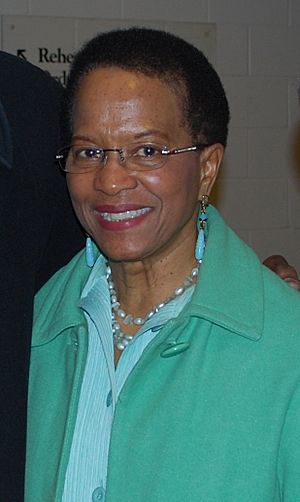Reatha Clark King facts for kids
Quick facts for kids
Reatha Clark King
|
|
|---|---|
 |
|
| Born |
Reatha Belle Clark
April 11, 1938 |
| Alma mater | |
| Occupation | chemist and businesswoman |
| Employer | General Mills, Inc. |
Reatha Belle Clark King, born on April 11, 1938, is an amazing American chemist and a successful businesswoman. She used to be a top leader at General Mills, a big company that makes food. She also led the General Mills Foundation, which helps communities by giving money to good causes.
Contents
Early Life and Learning
Reatha Belle Clark was born in Pavo, Georgia, USA, on April 11, 1938. Her dad, Willie B. Clark, was a farmer who shared his crops with the landowner. Her mom, Ola Mae Watts Campbell, only went to school until third grade.
School Days in Georgia
Reatha started elementary school in a special one-room school for Black children. It was held at Mt. Zion Baptist Church. Later, she went to school in Coolidge, Georgia, and then high school in Moultrie, Georgia. In 1954, she graduated as the top student from Moultrie High School for Negro Youth. This was the same year that a big court case, Brown v. Board of Education, said that separate schools for different races were against the law.
College and Science Studies
Reatha was invited to attend Clark College in Atlanta. She first planned to study home economics. But the head of the chemistry department, Alfred Spriggs, encouraged her to become a research chemist. Reatha earned a bachelor's degree in chemistry and math from Clark College.
Professor Spriggs also helped her get a special scholarship from the Woodrow Wilson National Fellowship Foundation. This scholarship helped her study at the University of Chicago. She earned a master's degree in chemistry in 1960. She continued her studies there, working with Professor Ole J. Kleppa, and earned her Ph.D. in chemistry in 1963. While in Chicago, she also met and married N. Judge King.
Later, Reatha Clark King took a break from her work to earn another master's degree. She studied business management with a focus on money matters at Columbia University.
Science and University Work
After college, King worked for five years, from 1963 to 1968, as a research chemist. She worked at the National Bureau of Standards in Washington, D.C. She was the first African American woman chemist hired there. She used special tools to measure heat in chemical reactions. Much of her work helped measure the heat of certain fluorine compounds. This research was very important for the NASA space program. She even received an award for her paper on this work. Her two children were born during this time. The methods she created for measuring heat are still used today.
Teaching and Leading at Universities
King and her family moved to New York when her husband got a job there. Reatha became a professor at York College, City University of New York. She taught chemistry from 1968 to 1977. She also became a leader at the college, first as an associate dean for science and math, and then for all academic affairs.
In 1977, she moved to Minnesota to become the president of Metropolitan State University. She worked there until 1988. She helped the university grow a lot. She also worked to get more minority students and women involved in higher education. Her husband also found a job in Minnesota as a chemist.
Business Career
In 1988, Reatha King was asked to join General Mills in Minneapolis, Minnesota. She took on two big jobs there. She became a vice president of the General Mills Corporation. She also became the president and executive director of the General Mills Foundation. This foundation is the part of General Mills that gives money to good causes. She held these jobs from 1988 to 2002. In 2002, she became the chairman of the foundation's board of trustees. She retired from General Mills completely in 2003. Under her leadership, the General Mills Foundation helped many communities across the country.
Serving on Boards
King has also been a leader on the boards of many other companies. These include ExxonMobil, Wells Fargo & Company, and the H. B. Fuller Company. In 1994, President Bill Clinton asked her to join the Board of Directors for the Corporation for National and Community Service. This group helps people volunteer and serve their communities. She also worked with non-profit groups like the International Trachoma Initiative and the Council on Foundations.
She has a strong interest in education. She once said, "I realized early in life that education is our best enabling resource... and that my stamina for championing educational opportunity for all people is inexhaustible." This means she believes education is the best way to help people succeed, and she will never stop working to make sure everyone has a chance to learn.
Awards and Honors
Reatha Clark King has received many special awards and honorary degrees. Some of them include:
- The Governor's Civil Rights Legend Award in 2019.
- The International Citizen Award in 2013.
- Director of the Year from the National Association of Corporate Directors in 2004.
- Being named one of Ebony magazine's Top 50 Black Executives in Corporate America in 1992.
- The Exceptional Black Scientist Award in 1984.
- The Defender of Democracy Award.
 | Bessie Coleman |
 | Spann Watson |
 | Jill E. Brown |
 | Sherman W. White |

